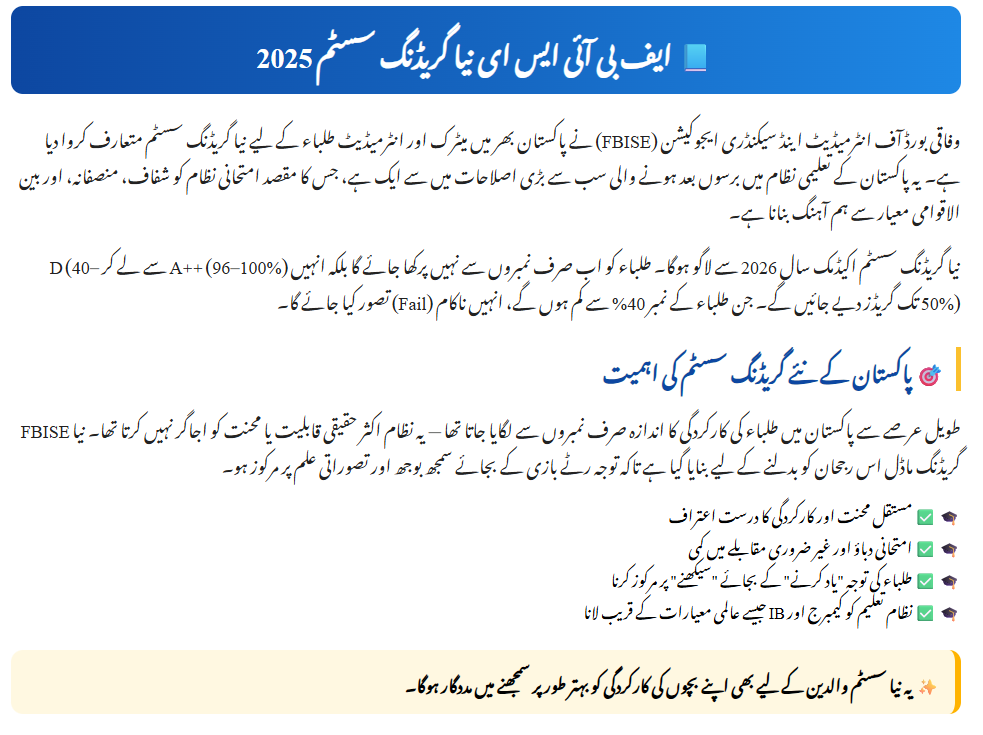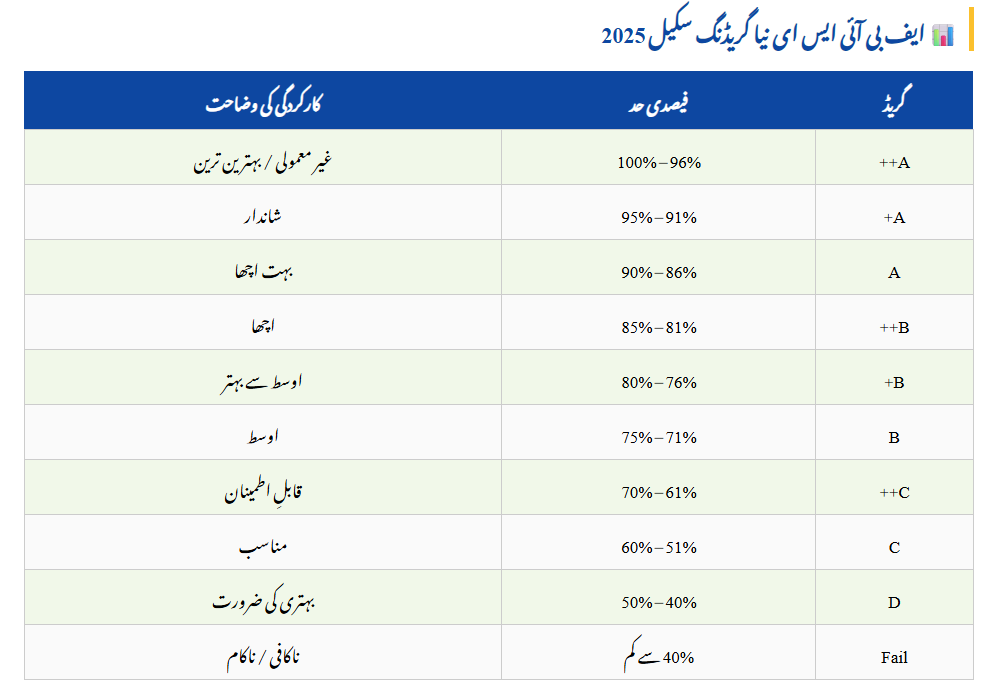FBISE Introduces New Grading System 2025
In a major academic reform, the Federal Board of Intermediate and Secondary Education (FBISE) has officially introduced a new grading system for Matric and Intermediate students across Pakistan.
This marks the first significant change in the country’s evaluation process in years — aiming to make assessments more transparent, fair, and internationally aligned.
Starting from the academic year 2026, students will no longer be judged only by marks. Instead, they will receive grades ranging from A++ (96–100%) to D (40–50%), while those scoring below 40% will be considered Fail.
Why Pakistan’s New Grading System Matters
For decades, Pakistan’s students have been evaluated purely on numerical marks — a system that often fails to highlight actual understanding and effort.
The new FBISE grading model aims to shift the focus from rote learning to conceptual understanding.
According to education experts, this reform will:
- Recognize consistent effort and performance.
- Reduce exam stress and unhealthy competition.
- Encourage students to focus on learning, not memorization.
- Align Pakistan’s education evaluation with global academic standards like Cambridge and IB systems.
This move also gives parents a clearer picture of their child’s academic standing.

FBISE New Grading Scale 2025 (Effective from 2026 Exams)
Here’s the complete breakdown of the new grading structure for Matric and Intermediate levels:
| Grade | Percentage Range | Performance Description |
|---|---|---|
| A++ | 96% – 100% | Outstanding / Exceptional |
| A+ | 91% – 95% | Excellent |
| A | 86% – 90% | Very Good |
| B++ | 81% – 85% | Good |
| B+ | 76% – 80% | Above Average |
| B | 71% – 75% | Average |
| C++ | 61% – 70% | Satisfactory |
| C | 51% – 60% | Acceptable |
| D | 40% – 50% | Needs Improvement |
| Fail | Below 40% | Unsatisfactory |
The introduction of plus grades (A+, B+, C++) ensures fair recognition for students who perform well but may not top their class.
What Makes This System Different
The new grading system shifts the emphasis from marks-based competition to skill-based evaluation.
Here’s why it’s being widely praised by educators and parents:
- 🎯 Fair Assessment: Rewards conceptual clarity, not rote memorization.
- 🌱 Encourages Motivation: Students can aim for clear grade milestones.
- 🌍 Global Compatibility: Matches grading models used internationally.
- 🔍 Transparency: Grades are easy to understand for both parents and institutions.
Officials from FBISE stressed that this reform isn’t just a grading update — it’s a cultural shift in education meant to improve learning outcomes nationwide.

Reactions from Students and Teachers
The response so far has been overwhelmingly positive.
Teachers believe it will reduce exam pressure and promote real learning, while students feel relieved that their efforts will now be acknowledged more fairly.
The introduction of A++ and B++ grades allows finer distinctions among top achievers, motivating students to perform better without excessive stress.

Implementation Timeline
According to FBISE officials, the new grading system will be officially implemented from the 2026 examination session.
All FBISE-affiliated schools (Matric and Inter levels) will adopt this structure.
Other provincial education boards are also considering adopting similar grading systems in the coming years.
Final Thoughts
The FBISE New Grading System 2025 is a milestone reform that will reshape how student performance is measured in Pakistan.
By prioritizing fairness, motivation, and learning quality, it sets a positive precedent for all educational boards.
From 2026 onward, grades like A++ or B+ will symbolize more than just academic success — they’ll represent hard work, creativity, and progress.
This change reflects a broader message:
📖 Pakistan’s education system is evolving — and it’s now centered on recognizing effort, ability, and growth.
FAQs (Frequently Asked Questions)
1. What is the new grading system introduced by FBISE in 2025?
The Federal Board of Intermediate and Secondary Education (FBISE) has introduced a letter-grade system for Matric and Intermediate students starting from the 2026 academic session. Instead of numerical marks, students will now receive grades from A++ (96–100%) to D (40–50%), while below 40% will be marked as Fail.
2. When will the new grading system come into effect?
The new grading policy will officially take effect from the 2026 annual examinations for all FBISE-affiliated schools and colleges across Pakistan.
3. Why did FBISE change from marks to grades?
The change aims to make evaluation more transparent, student-friendly, and internationally aligned. It reduces exam stress, discourages rote learning, and focuses on conceptual understanding and performance consistency.
4. How does the new grading scale benefit students?
The new grading system rewards students for their effort and improvement rather than only top scores. Grades like A+, B+, and C++ offer fair recognition for performance differences and help reduce unhealthy competition.
5. Will provincial boards also adopt the new grading system?
While the FBISE has implemented the reform first, provincial education boards are reviewing the same model and may adopt similar grading frameworks in the coming years to ensure uniformity across Pakistan.
Related Posts













